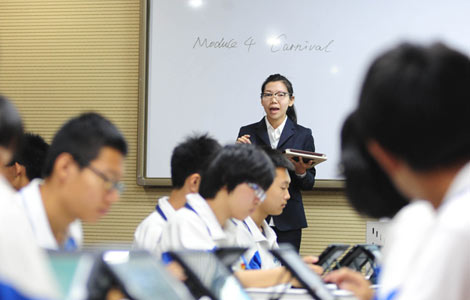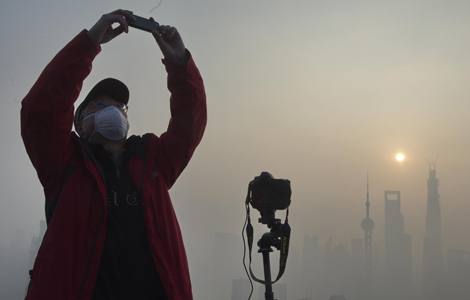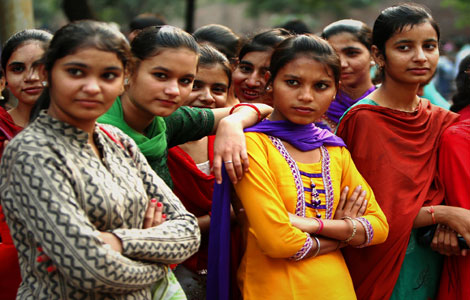United Way improves traction in China
Updated: 2013-12-09 10:02
By Zhang Yuwei in New York (China Daily USA)
|
||||||||
After a 15-year presence in China, United Way, the world's largest privately-funded nonprofit organization, recently launched a new partnership with the Shanghai Charity Foundation to improve school conditions for migrant children.
The new partnership is not only a milestone in US-China philanthropic relations, but also a test for the organization to expand the program into other Chinese cities, said United Way's CEO Brian Gallagher.
"As the urbanization policy continues to evolve, social needs are going to continue to get more complex and larger, so our focus will be on young children," said Gallagher.
The early-learning programs aim to provide education, nutrition and social support for children from birth to six years old of migrant families through the support of Chinese and Western companies.
The initiative adopts Born Learning, United Way's public engagement campaign that builds on awareness, education and action, to help parents and communities create early learning opportunities for young children.
Gallagher said he hopes this program will help tackle the challenge for Shanghai, and other big cities as it expands, as many migrant workers are moving into the city for work.
The rising migrant population has put pressure on various social resources including education in China. Shanghai's migrant population rose to 9.6 million in 2012, according to a study by Fudan University.
The world's largest non-profit now operates in some 41 countries and regions and started a partnership with China Charity Federation 15 years ago. Gallagher, who travels to China often to advise the government on non-profit operations, said he sees great potential in the expansion of China's non-profits where the increasing middle class and mega-rich can step in and lend a hand.
"Our overall focus is common good," said Gallagher, adding that's where the real synergy is. "It's important to do these things together."
United Way was one of the early examples China's NGO sector studied in the 1990s when the government looked into expanding its non-profit services.
China Charity Federation, a partner with United Way in China, was formed after China's ministry of civil affairs sent a delegation to the US to learn more about the United Way's work in 1994.
"What I see in China right now is that you have government supported NGOs and other NGOs set up by wealthy individuals like Jet Li," said Gallagher.
The government can help create incentive and transparent regulations to create non-profits and then pilot approaches locally, he said.
"The approach that the Chinese government and businesses have taken to economic expansion can fit in charity and philanthropy as well," said Gallagher.
The government has been "methodical" by always thinking about the future, said Gallagher. "The next step for the government is to — like Shanghai — allow more independence, the same way you have with the free trade zone."
These non-profit services, which need to be trained and regulated, will also bridge the gap between those in need and the wealthy individuals who can give and help, Gallagher pointed out.
The world's second-largest economy's emerging urban middle class totaled 125 million in 2012, and the number is expected to reach 356 million by 2020, according to ZenithOptimedia. There is no official number of China's billionaires, but a recent global study — Wealth-X and UBS Billionaire Census 2013 — showed there were 157 billionaires in China with a total net worth of $384 billion and an average age of 53 — nine years younger than the global average age of billionaires.
"One of things I think is very important to realize, in terms of the economic success of China, is it's not unlike the industrialization of the West 150 years ago, the difference is it's happening so much faster," said Gallagher.
"So wealth has been created in a very quick order, (and) the middle class has been evolving very fast."
Although the concept of philanthropy is not as well understood as it is in the United States, the "human instinct" is the same, said Gallagher, "for now many wealthy people who feel fortunate and realize they should give back".
"The biggest challenge now for China in this phase is that there needs to be a creation of a non-profit industry — small- and medium-sized direct service non-profits who actually provide services," said Gallagher.
That's also where the rich individuals can put their money, he added.
Contact the writer at yuweizhang@chinadailyusa.com
Most Viewed
Editor's Picks

|

|

|

|

|

|
Today's Top News
DPRK leader's uncle stripped of all posts
United Way improves traction in China
China's inflation up 3% in Nov
China issues guidelines on official receptions
Winning season for ZTE USA and Rockets
3rd Plenum 'a success': expert
ROK decides to expand air defense zone
Trade surplus hit record high in Nov
US Weekly

|

|















